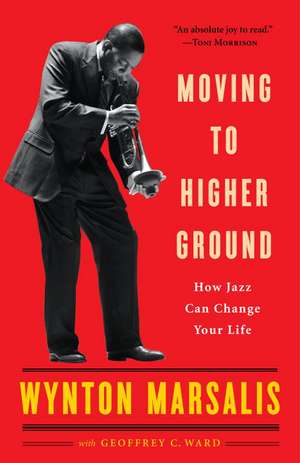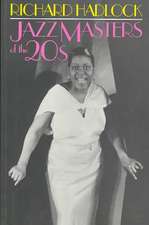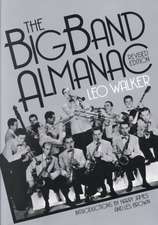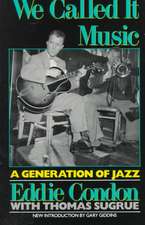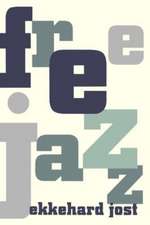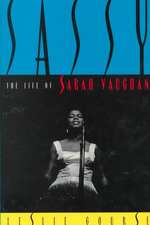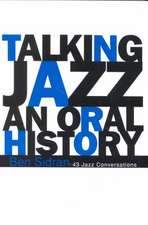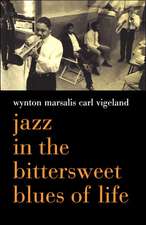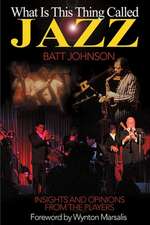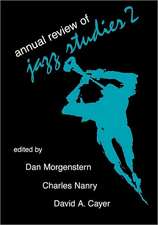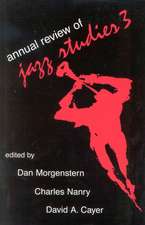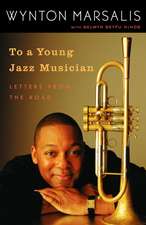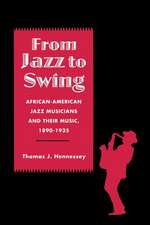Moving to Higher Ground: How Jazz Can Change Your Life
Autor Wynton Marsalis, Geoffrey Warden Limba Engleză Paperback – 31 aug 2009
Preț: 109.24 lei
Nou
Puncte Express: 164
Preț estimativ în valută:
20.91€ • 21.75$ • 17.26£
20.91€ • 21.75$ • 17.26£
Carte tipărită la comandă
Livrare economică 14-28 aprilie
Preluare comenzi: 021 569.72.76
Specificații
ISBN-13: 9780812969085
ISBN-10: 0812969081
Pagini: 208
Ilustrații: CHAPTER-OPENING PHOTOS
Dimensiuni: 127 x 209 x 14 mm
Greutate: 0.18 kg
Editura: Random House Trade
ISBN-10: 0812969081
Pagini: 208
Ilustrații: CHAPTER-OPENING PHOTOS
Dimensiuni: 127 x 209 x 14 mm
Greutate: 0.18 kg
Editura: Random House Trade
Notă biografică
Wynton Marsalis, the artistic director of Jazz at Lincoln Center, musician, educator, and composer, was born in New Orleans, Louisiana, and received his first trumpet from renowned musician Al Hirt at the age of six. Marsalis has won nine Grammy Awards, in both jazz and classical categories, and is the only artist to have won Grammy Awards in five consecutive years, from 1983 to 1987. In 1997, Marsalis’s oratorio on slavery and freedom, Blood on the Fields, became the first and, to date, only jazz composition to win the Pulitzer Prize in music.
Geoffrey C. Ward, a historian, screenwriter, and former editor of American Heritage, is the bestselling author of many books, including The War: An Intimate History, 1941-1945, Jazz: A History of America’s Music, and A First-Class Temperament: The Emergence of Franklin Roosevelt, which won a National Critics Circle Award.
From the Hardcover edition.
Geoffrey C. Ward, a historian, screenwriter, and former editor of American Heritage, is the bestselling author of many books, including The War: An Intimate History, 1941-1945, Jazz: A History of America’s Music, and A First-Class Temperament: The Emergence of Franklin Roosevelt, which won a National Critics Circle Award.
From the Hardcover edition.
Extras
CHAPTER ONE
Discovering the Joy of Swinging
Kids were supposed to stay in the back room. But some kind of way I stumbled into the front room of this tiny wood-frame house in Little Farms, Louisiana. I must have been four or five years old at the time, but I remember it was dark in there, lit only by a soft blue light or a red one, and a lot of grown-ups, men and women, were snapping their fingers on two and four and grooving to a rhythm and blues song. Some sang the words, but they were all dancing up a healthy sweat. I didn’t know what was going on back then, but I could tell it was something good—so good I wasn’t supposed to be around it.
Well, I could be around the music, couldn’t miss it, actually. R&B was always on the radio: “Baby this” and “Baby that”; “I need you, girl”; “Why’d you leave me? Come back. Ohhh!” That music was a way of life. Everybody knew those songs and everybody loved them: “I Heard It Through the Grapevine”; “Stop! In the Name of Love”; “Lean on Me”; “Papa’s Got a Brand New Bag.”
Now, jazz was different. That’s what my father played: modern jazz. No one danced to it, ever. That had something to do with rhythm. The backbeat of R&B was steady and unchanging. The rhythms my daddy and his friends played were ever changing and many, a torrent of ideas that came together and felt good. I later came to know it as swing.
The first jazz gigs I remember going to with my older brother Branford were like recitals. Only a handful of older people turned up. Some gave us candy, and there was always a good opportunity for us to run around. I noticed that very few black people seemed to like this kind of music. As a matter of fact, so few people understood it, I wondered why my father and his friends bothered to play it at all.
Then, when I was about eight or nine, I began to notice something very strange. Even though most of the people in our community would never attend a jazz concert (or anything artistic for that matter), even though they didn’t even consider playing music to be a profession, they had a type of respect for my father. I figured it had to have something to do with jazz, because he certainly was not in possession of any material goods indicative of even the slightest financial success.
I began to pay closer attention to all the jazzmen who came to our house or played with my father in clubs around New Orleans. They were an interesting group, if you could get past how different they seemed to be. First, they had their own language, calling each other “cats,” calling jobs “gigs” and instruments “axes,” peppering their conversations with all types of colorful, pungent words and unapologetic truisms.
Even if you were a child, they spoke directly to you and might actually listen to what you had to say.
Of course, they talked about men and women, politics and race and sports. But above all, they loved to talk about jazz music, its present and its past at once, like it was all now: “ ’Trane and them was playin’ so much music I couldn’t move. And people had been telling me all week they weren’t playing nothin’. Man, the music stood me up at the door.”
They could go on and on about what different musicians played or did or said, great men who all seemed to have colorful names: “Frog,” “Rabbit,” “Sweets.” It seemed to me that all of these people knew one another or at least had some type of connection. For all of that hard, profane talk, there was an unusual type of gentleness in the way they treated one another. Always a hug upon greeting and—from even the most venerated musicians—sometimes a kiss on the cheek. A natural ease with those teetering on the edge of sanity. A way of admonishing but not alienating those who might have drug problems. Always the feeling that things in our country, in our culture, in our souls, in the world, would get better. And beyond that, the feeling that this mysterious music would someday help people see how things fit together: segregation and integration, men and women, the political process, even the stock market.
That’s why these were still confident, optimistic men. Even though they were broke and misunderstood, sometimes difficult of personality, sometimes impaired by a too intense encounter with mind-altering substances and trapped in a culture that was rapidly moving away from professional levels of musicianship, romantic expression, and the arts in general, they still believed in the value of this jazz they played and still understood that their job was inventing music—and making sense of it with one another.
They improvised.
Now, the ability to improvise—to make up things that could get you out of a tight spot—well, everyone needed to know how to do that, even if it was just coming up with the right words at the right time. I thought there must be something to this improvised music. I needed to learn more about it. And hanging around jazz musicians was a great education for a nine- or ten-year-old because they told great stories and they knew how to listen. That was their way, talking and listening, listening and talking.
My father could talk for hours, still can. But he would also listen intently and never respond in that patronizing way that drives kids crazy. I have all kinds of memories of telling him partially-fabricated stories of what I had done in a football or basketball game and him just standing there listening intently to every detail and cosigning, “Uh-huh. Yep.” When he and other jazzmen listened to records or the radio, they could hear all kinds of things I didn’t come close to noticing. I couldn’t understand how three notes from a tenor saxophone was all they needed to conclude, “That’s Gene Ammons.” “Yeah, that’s ‘Jug,’ ” or “Monk, I hear you, Thelonious!” That seemingly magical ability to hear made me figure that perhaps my father knew when I was embellishing stuff.
He and his friends seemed to be able to follow every moment of what the person played. Now, you have to remember, the rest of us were listening to three-minute records of tunes with words, words that were as easy to memorize as the thirty seconds of repeated musical accompaniment. But these guys were listening to things like Sonny Rollins’s “Alfie’s Theme,” seven or eight minutes of somebody playing all kind of saxophone up and down the horn, following it as if it were spoken by the oracle at Delphi, saying, “Tell your story,” and so on. There would be certain points in the music where the “um-hmms” became “ohhh” or “oowee!”—the type of ecstatic eruptions that overcame some people in church. They would respond to Sonny as if he were right there in the room, and during all that seven or eight minutes not one word on the recording, spoken or sung! And I’d be sitting there listening to them speaking in what was almost a foreign language, trying to understand, wanting to learn it.
At twelve, I began listening to John Coltrane, Clifford Brown, Miles Davis, and Freddie Hubbard. Just by paying serious attention to these musicians every day, I came to realize that each musician opens a chamber into the very center of their being and expresses that center in the uniqueness of their sound. The sound of a master musician is as personalized and distinct as the sound of a person’s voice. has. After that basic realization, I focused on what they were communicating through music—pure truth, delivered with the intimacy of friends revealing some secret, sensitive detail about themselves. It takes courage and trust to share things. Many times the act of revelation brings someone closer to you. In learning about a person, you learn something about the world and about yourself, and if you can handle what you learn, you can get closer, much closer to them.
That’s why, I came to understand, the scuffling jazzmen around my father were so self-assured. They didn’t mind you knowing who they were. With Coltrane, of course, I was impressed with his virtuosity, his ability to run up and down his horn. Everyone who heard him was. But I noticed that the most meaningful phrases were almost never technically challenging. They were succinct phrases that would run right through you, the way we remember profound nuggets from Shakespeare’s plays that can both cut through you and linger; all those words in Hamlet but you remember “To be or not to be” or “to sleep perchance to dream.” Something in those type of phrases reveals universal truth.
The best way I can describe it is through the feeling between two people. Before any words are spoken, before one makes any gesture toward the other, there is a feeling. And that feeling loses intensity and purity when translated into words or gestures. When someone reaches up to kiss you or says “I love you,” those acts are reductions of that bigger feeling. But if someone figures out how to communicate that big feeling—how to master a moment of soul—they just look at you with directness and honesty and love. Eyes alone can warm your entire body. We most often experience this unencumbered feeling from children. But some adults give it, too. Because jazz musicians improvise under the pressure of time, what’s inside comes out pure. It’s like being pressed to answer a question before you have a chance to get your lie straight. The first thought is usually the truth.
That purity of feeling is what I heard in Coltranes’s sound. His sound was his feeling. You also heard Tommy Flanagan’s feeling when he improvised at his piano; then you had Paul Chambers’s feeling on the bass and Art Taylor’s on the drums. A single performance was an improvised symphony of their combined feeling, made more honest by the pressure of time.
It’s not easy to find words for the kind of emotions that jazz musicians convey. You don’t have a name for the feeling of light peeking through the drapes in your childhood bedroom. Or how the teasing of classmates hurt. You don’t have a name for the feeling of late-night silence on a car ride with your father or how you love your wife’s smile when you tease her. But those feelings are real, even more real because you can’t express them in words. Jazz allows the musician to instantly communicate exactly how he or she experiences life as it is felt, and the instant honesty of that revelation shocks listeners into sharing and experiencing that feeling, too.
Some popular music evokes nostalgia. Your memory of your own emotions fills the songs with meaning: “You remember this one, baby? This was when I had that old beat-up Oldsmobile and used to pick you up in it and this was our prom song.” But jazz music is about the power of now. There is no script. It’s conversation. The emotion is given to you by musicians as they make split-second decisions to fulfill what they feel the moment requires. The explanation can be complicated, but the music is very direct and basic. And because Coltrane felt so strongly about things, his sound remains potent and present. We can still feel him and Louis Armstrong and Thelonious Monk and all of the great ones. And we can feel and empathize with many other musicians, too, if we allow their sounds to reach and fill some space inside of us.
Jazz makes it possible for individuals to shape a language out of their feeling and use that very personal language to communicate exactly how the world feels to them. Recordings froze the sounds of these musicians, affording us the pleasure of entering their world whenever we wish. The world according to Lester Young. Mmmm. That’s where I want to be. Then, to be there over and over again.
The best jazz for me back then, however, was always live. I loved to hear my father and James Black or Clark Terry or Sonny Stitt electrify a room. Live, the music unfolded right in front of you. All over you.
Now, at first I could hear and relate to ’Trane’s sound but didn’t necessarily understand what he was playing. It was hard to follow. One solo had enough music for about forty of the radio songs that I could comprehend. But I kept trying to hear and follow, like a kid listening to adult conversation.
Then, one day, I could actually understand—not in my mind but in my heart. It came to me all of a sudden. What he was playing made perfect sense; actually super-sense. These musicians were telling stories. And these bittersweet stories unfolded in unpredictable ways. The musicians themselves were often surprised by their inventions. But they worked with the surprises the way a bull rider adjusts his weight and angles to stay on board. It was a language, and after you could comprehend the song of the language there’s no need for words. The song is the language. The song was the language.
When I started learning about jazz, I wasn’t into any kind of art. I had no idea it could have a practical purpose. Now, more than thirty years later, I testify to the power of art, and more specifically jazz, to improve your life—and keep on improving it.
I know now that my father and his fellow musicians possessed such confidence because of their relationship with an art form. Although they struggled with our way of life, with segregation and all types of small unnamed injustices, with personal situations that were as full of drama, unhappiness, and strife as anyone else’s, they enjoyed who they were.
I noticed that religion gave some people a way to escape dealing with the world: “Things will be better when you die,” the people of my grandma’s generation said as they worked themselves to death. “God wants you to forgive and love those who do you wrong,” some people said to shake off the shame of being unable to respond to the abuse they endured. The holier-than-thou faction found comfort in believing, “The rest of y’all are lost because you don’t have a personal relationship with God—our God.”
But art engages you in the world, not just the world around you but the big world, and not just the big world of Tokyo and Sydney and Johannesburg, but the bigger world of ideas and concepts and feelings of history and humanity.
From the Hardcover edition.
Discovering the Joy of Swinging
Kids were supposed to stay in the back room. But some kind of way I stumbled into the front room of this tiny wood-frame house in Little Farms, Louisiana. I must have been four or five years old at the time, but I remember it was dark in there, lit only by a soft blue light or a red one, and a lot of grown-ups, men and women, were snapping their fingers on two and four and grooving to a rhythm and blues song. Some sang the words, but they were all dancing up a healthy sweat. I didn’t know what was going on back then, but I could tell it was something good—so good I wasn’t supposed to be around it.
Well, I could be around the music, couldn’t miss it, actually. R&B was always on the radio: “Baby this” and “Baby that”; “I need you, girl”; “Why’d you leave me? Come back. Ohhh!” That music was a way of life. Everybody knew those songs and everybody loved them: “I Heard It Through the Grapevine”; “Stop! In the Name of Love”; “Lean on Me”; “Papa’s Got a Brand New Bag.”
Now, jazz was different. That’s what my father played: modern jazz. No one danced to it, ever. That had something to do with rhythm. The backbeat of R&B was steady and unchanging. The rhythms my daddy and his friends played were ever changing and many, a torrent of ideas that came together and felt good. I later came to know it as swing.
The first jazz gigs I remember going to with my older brother Branford were like recitals. Only a handful of older people turned up. Some gave us candy, and there was always a good opportunity for us to run around. I noticed that very few black people seemed to like this kind of music. As a matter of fact, so few people understood it, I wondered why my father and his friends bothered to play it at all.
Then, when I was about eight or nine, I began to notice something very strange. Even though most of the people in our community would never attend a jazz concert (or anything artistic for that matter), even though they didn’t even consider playing music to be a profession, they had a type of respect for my father. I figured it had to have something to do with jazz, because he certainly was not in possession of any material goods indicative of even the slightest financial success.
I began to pay closer attention to all the jazzmen who came to our house or played with my father in clubs around New Orleans. They were an interesting group, if you could get past how different they seemed to be. First, they had their own language, calling each other “cats,” calling jobs “gigs” and instruments “axes,” peppering their conversations with all types of colorful, pungent words and unapologetic truisms.
Even if you were a child, they spoke directly to you and might actually listen to what you had to say.
Of course, they talked about men and women, politics and race and sports. But above all, they loved to talk about jazz music, its present and its past at once, like it was all now: “ ’Trane and them was playin’ so much music I couldn’t move. And people had been telling me all week they weren’t playing nothin’. Man, the music stood me up at the door.”
They could go on and on about what different musicians played or did or said, great men who all seemed to have colorful names: “Frog,” “Rabbit,” “Sweets.” It seemed to me that all of these people knew one another or at least had some type of connection. For all of that hard, profane talk, there was an unusual type of gentleness in the way they treated one another. Always a hug upon greeting and—from even the most venerated musicians—sometimes a kiss on the cheek. A natural ease with those teetering on the edge of sanity. A way of admonishing but not alienating those who might have drug problems. Always the feeling that things in our country, in our culture, in our souls, in the world, would get better. And beyond that, the feeling that this mysterious music would someday help people see how things fit together: segregation and integration, men and women, the political process, even the stock market.
That’s why these were still confident, optimistic men. Even though they were broke and misunderstood, sometimes difficult of personality, sometimes impaired by a too intense encounter with mind-altering substances and trapped in a culture that was rapidly moving away from professional levels of musicianship, romantic expression, and the arts in general, they still believed in the value of this jazz they played and still understood that their job was inventing music—and making sense of it with one another.
They improvised.
Now, the ability to improvise—to make up things that could get you out of a tight spot—well, everyone needed to know how to do that, even if it was just coming up with the right words at the right time. I thought there must be something to this improvised music. I needed to learn more about it. And hanging around jazz musicians was a great education for a nine- or ten-year-old because they told great stories and they knew how to listen. That was their way, talking and listening, listening and talking.
My father could talk for hours, still can. But he would also listen intently and never respond in that patronizing way that drives kids crazy. I have all kinds of memories of telling him partially-fabricated stories of what I had done in a football or basketball game and him just standing there listening intently to every detail and cosigning, “Uh-huh. Yep.” When he and other jazzmen listened to records or the radio, they could hear all kinds of things I didn’t come close to noticing. I couldn’t understand how three notes from a tenor saxophone was all they needed to conclude, “That’s Gene Ammons.” “Yeah, that’s ‘Jug,’ ” or “Monk, I hear you, Thelonious!” That seemingly magical ability to hear made me figure that perhaps my father knew when I was embellishing stuff.
He and his friends seemed to be able to follow every moment of what the person played. Now, you have to remember, the rest of us were listening to three-minute records of tunes with words, words that were as easy to memorize as the thirty seconds of repeated musical accompaniment. But these guys were listening to things like Sonny Rollins’s “Alfie’s Theme,” seven or eight minutes of somebody playing all kind of saxophone up and down the horn, following it as if it were spoken by the oracle at Delphi, saying, “Tell your story,” and so on. There would be certain points in the music where the “um-hmms” became “ohhh” or “oowee!”—the type of ecstatic eruptions that overcame some people in church. They would respond to Sonny as if he were right there in the room, and during all that seven or eight minutes not one word on the recording, spoken or sung! And I’d be sitting there listening to them speaking in what was almost a foreign language, trying to understand, wanting to learn it.
At twelve, I began listening to John Coltrane, Clifford Brown, Miles Davis, and Freddie Hubbard. Just by paying serious attention to these musicians every day, I came to realize that each musician opens a chamber into the very center of their being and expresses that center in the uniqueness of their sound. The sound of a master musician is as personalized and distinct as the sound of a person’s voice. has. After that basic realization, I focused on what they were communicating through music—pure truth, delivered with the intimacy of friends revealing some secret, sensitive detail about themselves. It takes courage and trust to share things. Many times the act of revelation brings someone closer to you. In learning about a person, you learn something about the world and about yourself, and if you can handle what you learn, you can get closer, much closer to them.
That’s why, I came to understand, the scuffling jazzmen around my father were so self-assured. They didn’t mind you knowing who they were. With Coltrane, of course, I was impressed with his virtuosity, his ability to run up and down his horn. Everyone who heard him was. But I noticed that the most meaningful phrases were almost never technically challenging. They were succinct phrases that would run right through you, the way we remember profound nuggets from Shakespeare’s plays that can both cut through you and linger; all those words in Hamlet but you remember “To be or not to be” or “to sleep perchance to dream.” Something in those type of phrases reveals universal truth.
The best way I can describe it is through the feeling between two people. Before any words are spoken, before one makes any gesture toward the other, there is a feeling. And that feeling loses intensity and purity when translated into words or gestures. When someone reaches up to kiss you or says “I love you,” those acts are reductions of that bigger feeling. But if someone figures out how to communicate that big feeling—how to master a moment of soul—they just look at you with directness and honesty and love. Eyes alone can warm your entire body. We most often experience this unencumbered feeling from children. But some adults give it, too. Because jazz musicians improvise under the pressure of time, what’s inside comes out pure. It’s like being pressed to answer a question before you have a chance to get your lie straight. The first thought is usually the truth.
That purity of feeling is what I heard in Coltranes’s sound. His sound was his feeling. You also heard Tommy Flanagan’s feeling when he improvised at his piano; then you had Paul Chambers’s feeling on the bass and Art Taylor’s on the drums. A single performance was an improvised symphony of their combined feeling, made more honest by the pressure of time.
It’s not easy to find words for the kind of emotions that jazz musicians convey. You don’t have a name for the feeling of light peeking through the drapes in your childhood bedroom. Or how the teasing of classmates hurt. You don’t have a name for the feeling of late-night silence on a car ride with your father or how you love your wife’s smile when you tease her. But those feelings are real, even more real because you can’t express them in words. Jazz allows the musician to instantly communicate exactly how he or she experiences life as it is felt, and the instant honesty of that revelation shocks listeners into sharing and experiencing that feeling, too.
Some popular music evokes nostalgia. Your memory of your own emotions fills the songs with meaning: “You remember this one, baby? This was when I had that old beat-up Oldsmobile and used to pick you up in it and this was our prom song.” But jazz music is about the power of now. There is no script. It’s conversation. The emotion is given to you by musicians as they make split-second decisions to fulfill what they feel the moment requires. The explanation can be complicated, but the music is very direct and basic. And because Coltrane felt so strongly about things, his sound remains potent and present. We can still feel him and Louis Armstrong and Thelonious Monk and all of the great ones. And we can feel and empathize with many other musicians, too, if we allow their sounds to reach and fill some space inside of us.
Jazz makes it possible for individuals to shape a language out of their feeling and use that very personal language to communicate exactly how the world feels to them. Recordings froze the sounds of these musicians, affording us the pleasure of entering their world whenever we wish. The world according to Lester Young. Mmmm. That’s where I want to be. Then, to be there over and over again.
The best jazz for me back then, however, was always live. I loved to hear my father and James Black or Clark Terry or Sonny Stitt electrify a room. Live, the music unfolded right in front of you. All over you.
Now, at first I could hear and relate to ’Trane’s sound but didn’t necessarily understand what he was playing. It was hard to follow. One solo had enough music for about forty of the radio songs that I could comprehend. But I kept trying to hear and follow, like a kid listening to adult conversation.
Then, one day, I could actually understand—not in my mind but in my heart. It came to me all of a sudden. What he was playing made perfect sense; actually super-sense. These musicians were telling stories. And these bittersweet stories unfolded in unpredictable ways. The musicians themselves were often surprised by their inventions. But they worked with the surprises the way a bull rider adjusts his weight and angles to stay on board. It was a language, and after you could comprehend the song of the language there’s no need for words. The song is the language. The song was the language.
When I started learning about jazz, I wasn’t into any kind of art. I had no idea it could have a practical purpose. Now, more than thirty years later, I testify to the power of art, and more specifically jazz, to improve your life—and keep on improving it.
I know now that my father and his fellow musicians possessed such confidence because of their relationship with an art form. Although they struggled with our way of life, with segregation and all types of small unnamed injustices, with personal situations that were as full of drama, unhappiness, and strife as anyone else’s, they enjoyed who they were.
I noticed that religion gave some people a way to escape dealing with the world: “Things will be better when you die,” the people of my grandma’s generation said as they worked themselves to death. “God wants you to forgive and love those who do you wrong,” some people said to shake off the shame of being unable to respond to the abuse they endured. The holier-than-thou faction found comfort in believing, “The rest of y’all are lost because you don’t have a personal relationship with God—our God.”
But art engages you in the world, not just the world around you but the big world, and not just the big world of Tokyo and Sydney and Johannesburg, but the bigger world of ideas and concepts and feelings of history and humanity.
From the Hardcover edition.
Recenzii
“An absolute joy to read. Intimate, knowledgeable, supremely worthy of its subject. In addition to demolishing mediocre, uniformed critics, Moving to Higher Ground is a meaningful contribution to music scholarship.”—Toni Morrison
“I think it should be in every bookstore, music store, and school in the country.” —Tony Bennett
“Jazz, for Wynton Marsalis, is nothing less than a search for wisdom. He thinks as forcefully, and as elegantly, as he swings. When he reflects on improvisation, his subject is freedom. When he reflects on harmony, his subject is diversity and conflict and peace. When he reflects on the blues, his subject is sorrow and the mastery of it–how to be happy without being blind. There is philosophy in Marsalis’s trumpet, and in this book. Here is the lucid and probing voice of an uncommonly soulful man.”—New Republic
“Wynton Marsalis is absolutely the person who should write this book. Here he is, as young as morning, as fresh as dew, and already called one of the jazz greats. He is not only a seer and an exemplary musician, but a poet as well. He informs us that jazz was created, among other things, to expose the hypocrisy and absurdity of racism and other ignorances in our country. Poetry was given to human beings for the same reason. This book could be called “How Love Can Change Your Life,” for there could be no jazz without love. By love, of course, I do not mean mush, or sentimentality. Love can only exist with courage, and this book could not be written without Wynton Marsalis’s courage. He has the courage to make powerful music and to love the music so, that he willingly shares its riches with the entire human family. We are indebted to him.” —Maya Angelou
“A joyful primer . . . Come blow your horn–and let the music begin.”—O: The Oprah Magazine
“I think it should be in every bookstore, music store, and school in the country.” —Tony Bennett
“Wynton Marsalis has been a beacon for music since his early twenties. In Moving to Higher Ground, he continues to exhort, elevate, and educate us.”—Yo-Yo Ma
“I think it should be in every bookstore, music store, and school in the country.” —Tony Bennett
“Jazz, for Wynton Marsalis, is nothing less than a search for wisdom. He thinks as forcefully, and as elegantly, as he swings. When he reflects on improvisation, his subject is freedom. When he reflects on harmony, his subject is diversity and conflict and peace. When he reflects on the blues, his subject is sorrow and the mastery of it–how to be happy without being blind. There is philosophy in Marsalis’s trumpet, and in this book. Here is the lucid and probing voice of an uncommonly soulful man.”—New Republic
“Wynton Marsalis is absolutely the person who should write this book. Here he is, as young as morning, as fresh as dew, and already called one of the jazz greats. He is not only a seer and an exemplary musician, but a poet as well. He informs us that jazz was created, among other things, to expose the hypocrisy and absurdity of racism and other ignorances in our country. Poetry was given to human beings for the same reason. This book could be called “How Love Can Change Your Life,” for there could be no jazz without love. By love, of course, I do not mean mush, or sentimentality. Love can only exist with courage, and this book could not be written without Wynton Marsalis’s courage. He has the courage to make powerful music and to love the music so, that he willingly shares its riches with the entire human family. We are indebted to him.” —Maya Angelou
“A joyful primer . . . Come blow your horn–and let the music begin.”—O: The Oprah Magazine
“I think it should be in every bookstore, music store, and school in the country.” —Tony Bennett
“Wynton Marsalis has been a beacon for music since his early twenties. In Moving to Higher Ground, he continues to exhort, elevate, and educate us.”—Yo-Yo Ma
